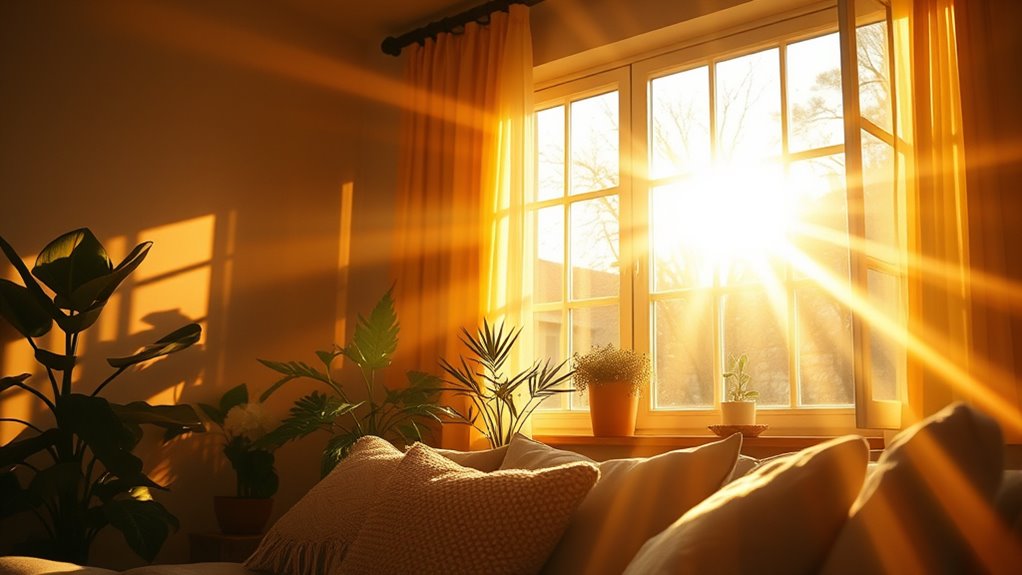Getting sunlight at home boosts your physical health by helping your body produce vitamin D, which supports bones and immunity. It also benefits your mood by increasing serotonin and reducing depression, especially during darker months. To stay safe, limit direct exposure to around 15-30 minutes daily, use window coverings if needed, and apply sunscreen for longer periods outdoors. Maintaining a well-lit space can enhance your overall well-being—exploring these tips will help you make the most of sunlight safely.
Key Takeaways
- Maximize natural light by keeping curtains open and positioning workspaces near windows.
- Limit direct sunlight exposure to 15-30 minutes daily to prevent skin damage.
- Spend time outdoors during peak sunlight hours (10 a.m. – 2 p.m.) for vitamin D and mood benefits.
- Use window coverings or sunscreen if sunlight causes glare or skin sensitivity.
- Incorporate well-lit indoor spaces to improve mental well-being and overall health.

Sunlight at home isn’t just about brightening your space; it plays a pivotal role in boosting your mood, improving your health, and making your surroundings feel more inviting. When you’re exposed to natural light, your body kicks into gear to produce vitamin D, an essential nutrient that supports bone health, immune function, and overall vitality. Without enough sunlight, your vitamin D synthesis diminishes, which can lead to feelings of fatigue and even contribute to mood disorders. By intentionally allowing sunlight into your home, you help your body generate this essential vitamin naturally, reducing the need for supplements and supporting your long-term health.
Beyond the physical benefits, sunlight profoundly impacts your mental well-being. Exposure to natural light triggers the release of serotonin, a neurotransmitter associated with mood enhancement. When you spend time in well-lit spaces, especially in the mornings, you’re likely to feel more alert, happier, and less prone to depression. Sunlight acts as a natural antidepressant, so making your home brighter during the day can help stabilize your mood and boost your overall mental clarity. This is especially important in winter months or in areas where daylight is limited, as it can combat seasonal affective disorder (SAD) and help you maintain a balanced emotional state.
To maximize these benefits, consider how you arrange your living spaces. Keep curtains and blinds open during the day, and position your workspace near windows so you can soak up as much natural light as possible. If you have a balcony or garden, spend time outdoors during peak sunlight hours—usually between 10 a.m. and 2 p.m.—to get the full benefits of vitamin D synthesis and mood enhancement. Even during cloudy days, natural light penetrates the atmosphere and can contribute to your well-being, so don’t underestimate the power of a well-lit environment. Incorporating skincare patches into your routine can help protect your skin from potential damage caused by prolonged sun exposure while still allowing you to enjoy the benefits of natural light.
However, it’s essential to practice safe exposure. While sunlight offers numerous benefits, too much direct sunlight can pose risks like skin damage and increased cancer risk. Aim for moderate exposure—about 15 to 30 minutes daily—depending on your skin type and geographic location. Use window coverings if you notice glaring sunlight or if it causes discomfort, and always wear sunscreen if you plan to be outside longer than recommended. By balancing safe exposure with mindful habits, you’ll enjoy the mood-boosting, health-supporting powers of sunlight without risking harm.
Frequently Asked Questions
How Does Sunlight Impact Indoor Plants’ Health?
Sunlight directly impacts your indoor plants’ health by promoting ideal plant growth. When your plants receive the right sunlight spectrum, they absorb essential light wavelengths that boost photosynthesis. Make sure they get enough indirect or filtered sunlight, as too little can stunt growth, while too much may cause leaf burn. Proper sunlight exposure helps your plants stay vibrant, healthy, and thriving inside your home.
Can Sunlight Help Reduce Indoor Mold Growth?
Sunlight acts like a natural disinfectant, helping to reduce indoor mold growth. By increasing sunlight penetration, you can create an environment less conducive to mold, which thrives in damp, dark areas. Regular exposure to sunlight discourages mold prevention by drying out surfaces and lowering humidity levels. So, making sure your space gets enough natural light can markedly help keep mold at bay and improve your home’s overall air quality.
What Are the Best Times for Safe Sunlight Exposure Indoors?
You should seek sunlight during the early morning or late afternoon for safe indoor exposure, as these times offer ideal timing with lower UV levels. To protect your skin, wear UV protection like sunscreen or protective clothing when sunlight is stronger. Limit exposure to about 15-30 minutes, depending on your skin type, to enjoy the benefits without risking damage. This approach helps you safely maximize sunlight’s positive effects indoors.
How Does Sunlight Affect Indoor Air Quality?
Sunlight can improve indoor air quality by reducing airborne bacteria and mold, effectively acting as a natural air purifier. It encourages natural ventilation when you open windows, letting fresh air circulate and dilute indoor pollutants. This combination helps clear toxins and promotes healthier indoor environments. So, by allowing sunlight in and maintaining good ventilation, you enhance air purification, making your home safer and more comfortable.
Are There Specific Windows or Curtains That Block Harmful UV Rays?
Yes, you can block harmful UV rays with UV filtering windows or UV protective curtains. UV filtering windows are specially designed to reduce UV exposure while letting in natural light, making your home safer. UV protective curtains also help by blocking out most UV rays when drawn, giving you added protection. Combining these options allows you to enjoy sunlight indoors without risking skin damage or fading your furniture.
Conclusion
Incorporating sunlight into your daily routine is like revealing a secret superpower for your well-being. By safely enjoying natural light at home, you’ll boost your mood, strengthen your immune system, and even improve sleep—truly a gift more precious than gold. Just remember, too much can be overwhelming, so strike the right balance. Embrace sunlight wisely, and watch your life transform into a brighter, healthier adventure—because sunlight isn’t just a source of light; it’s a fountain of endless energy.









